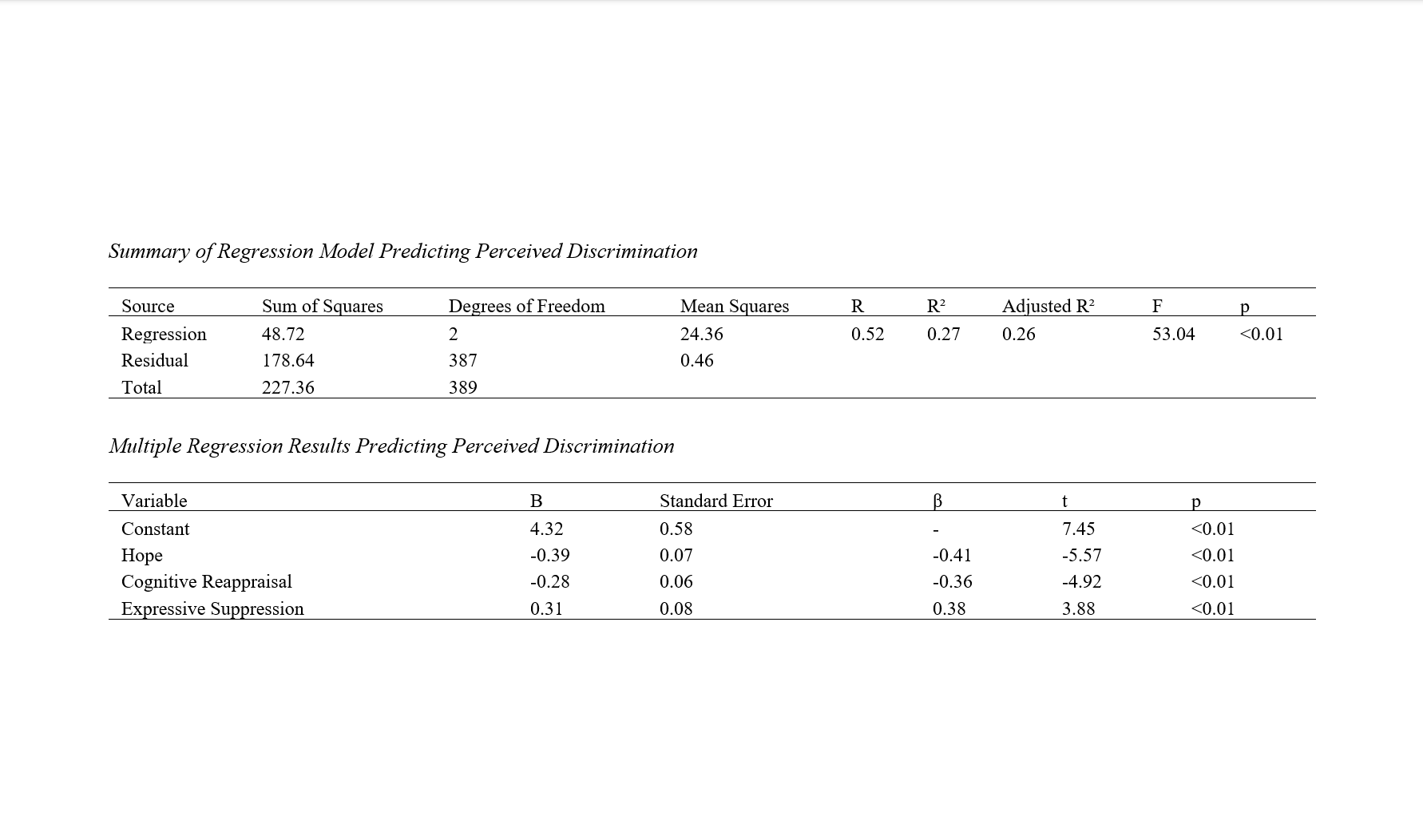Hope and Emotion Regulation as Predictors of Perceived Discrimination in Individuals with Physical Disabilities
Keywords:
Perceived discrimination, hope, emotion regulation, cognitive reappraisal, expressive suppression, physical disabilities, psychological resilienceAbstract
This study aimed to examine the predictive role of hope and emotion regulation in perceived discrimination among adults with physical disabilities. The study employed a correlational descriptive design with a sample of 390 adults with physical disabilities, selected based on the Morgan and Krejcie table. Participants completed validated measures assessing perceived discrimination, hope, and emotion regulation, including the Perceived Discrimination Scale, the Adult Hope Scale, and the Emotion Regulation Questionnaire. Data analysis was conducted using Pearson correlation to examine associations between variables and multiple linear regression to determine the predictive effect of hope and emotion regulation on perceived discrimination. Statistical analyses were performed using SPSS-27, with significance set at p < 0.01. The results indicated a significant negative correlation between hope and perceived discrimination (r = -0.45, p < 0.01) and between cognitive reappraisal and perceived discrimination (r = -0.38, p < 0.01), while expressive suppression was positively correlated with perceived discrimination (r = 0.41, p < 0.01). The regression model was statistically significant (F(2, 387) = 53.04, p < 0.01) with an R² value of 0.27, indicating that hope and emotion regulation explained 27% of the variance in perceived discrimination. Hope (B = -0.39, p < 0.01) and cognitive reappraisal (B = -0.28, p < 0.01) negatively predicted perceived discrimination, whereas expressive suppression (B = 0.31, p < 0.01) was a positive predictor. The findings suggest that hope and adaptive emotion regulation strategies, particularly cognitive reappraisal, serve as protective factors against perceived discrimination, whereas expressive suppression exacerbates discriminatory perceptions. These results highlight the importance of psychological interventions aimed at fostering hope and teaching adaptive emotion regulation strategies to mitigate the impact of discrimination in individuals with physical disabilities.
Downloads
References
Ameline, A., Ndobo, A., & Roussiau, N. (2019). Psychological Study of Perceived Religious Discrimination and Its Consequences for a Muslim Population. Religions, 10(3), 144.https://doi.org/10.3390/rel10030144
Bravo, G., Fuentes‐García, A., Arriagada, M., & Castellucci, H. I.(2024). Methodological Considerations in the Study of Perceived Discrimination at Work and Its Association With Workers Health and Occupational Outcomes: A Scoping Review. Medwave, 24(04), e2910-e2910.https://doi.org/10.5867/medwave.2024.04.2910
Budak, S. E., & Kaatsız, M. A. A. (2024). The Effect of Perceived Social Support and Spiritual Care Needs in Predicting Hope in Oncology Patients. Cancer Nursing.https://doi.org/10.1097/ncc.0000000000001370
Gabarrell‐Pascuet, A., Lloret-Pineda, A., Franch-Roca, M., MellorMarsá, B., Alos-Belenguer, M. d. C., He, Y., Hafi Elmokhtari, R. E., Villalobos, F., Bayes‐Marin, I., Pareja, L. A., Bobo, Ó. Á., Cabezas, M. E., Osorio, Y., Haro, J. M., & CristóbalNarváez, P. (2023). Impact of Perceived Discrimination and Coping Strategies on Well-Being and Mental Health in Newly-Arrived Migrants in Spain. PLoS One, 18(12), e0294295.https://doi.org/10.1371/journal.pone.0294295
He, Y., Wang, R., Mo, L., & Feng, L. (2024). Mediating Effects of Perceived Social Support on the Relationship Between Comfort and Hope in Hospitalized Patients With Acute Ischemic Stroke. Journal of nursing management, 2024(1).https://doi.org/10.1155/2024/6774939
Huynh, Q. L., Devos, T., & Smalarz, L. (2021). Perpetual Foreigner in One’s Own Land: Potential Implications for Identity and Psychological Adjustment.https://doi.org/10.31234/osf.io/p9q47 Khahra, A., Thomas, A., Caffrey, S., Taylor, E., Stull, M. J., Beasley, C., Banks, K. H., & Kohn-Wood, L. P. (2019). Hope Springs: Moderating the Link Between Racial Discrimination and Depressive Symptoms for African American Emerging Adults. Journal of Black Psychology, 45(5), 376-404.https://doi.org/10.1177/0095798419868874
Kim, D., & Lee, K. (2020). The Moderating Impact of Attending Services on the Effect of Older Adults’ Discrimination Experiences on Loneliness. Innovation in Aging, 4(Supplement_1), 323-323.https://doi.org/10.1093/geroni/igaa057.1035
Kim, S. (2024). Subjective Well-Being of International Students. Journal of International Students, 14(4), 570-590.https://doi.org/10.32674/jis.v14i4.6480
Krafft, A. M., Martin‐Krumm, C., & Fenouillet, F. (2017).Adaptation, Further Elaboration, and Validation of a Scale to Measure Hope as Perceived by People: Discriminant Value and Predictive Utility Vis-À-Vis Dispositional Hope. Assessment, 26(8), 1594-1609.https://doi.org/10.1177/1073191117700724
McDermott, R. C., Berry, A. T., Borgogna, N. C., Cheng, H. L., Wong, Y. J., Browning, B. R., & Carr, N. (2020). Revisiting the Paradox of Hope: The Role of Discrimination Among First-Year Black College Students. Journal of counseling psychology, 67(5), 637-644.https://doi.org/10.1037/cou0000422
McGee, J. S., Myers, D. R., Meraz, R., Polson, C., Ke, W., & McClellan, A. (2022). Hope Partially Mediates Stress and Perceived Burden in Family Caregivers of Persons Living With a Dementia. Innovation in Aging, 6(Supplement_1),756-757.https://doi.org/10.1093/geroni/igac059.2747
Scheitle, C. P., Bolger, D., Daniels, D., & Ecklund, E. H. (2023).The Connection Between Perceived Workplace Discrimination and Viewing Work as a Spiritual Calling. Journal for the Scientific Study of Religion, 62(2), 242-259.https://doi.org/10.1111/jssr.12842
Shang, G., Chen, X., & Liu, L. (2022). Impact of Perceived Discrimination on Travel Intention. Social Behavior and Personality an International Journal, 50(9), 1-11.https://doi.org/10.2224/sbp.11743
Soleimani, M. A., Zarabadi-Pour, S., Chan, Y. H., Allen, K. A., & Shamsizadeh, M. (2022). Factors Associated With Hope and Quality of Life in Patients With Coronary Artery Disease. Journal of Nursing Research, 30(2), e200.https://doi.org/10.1097/jnr.0000000000000476
Tang, H., & Xu, X. (2023). The Impact of Perceived Gender Discrimination on Job Performance. Journal of Education Humanities and Social Sciences, 22, 734-740.https://doi.org/10.54097/ehss.v22i.13352
Valdez, C. R., Walsdorf, A. A., Wagner, K. M., Snyder, V. N. S. d., García, D., & Villatoro, A. P. (2022). The Intersection of Immigration Policy Impacts and COVID‐19 for Latinx Young Adults. American Journal of Community Psychology, 70(3-4), 420-432.https://doi.org/10.1002/ajcp.12617
Wang, J., & Shaheen, M. (2022). Impact of Minority Perceived Discrimination on Resistance to Innovation and Moderating Role of Psychological Distress: Evidence From Ethnic Minority Students of China. Frontiers in psychology, 13.https://doi.org/10.3389/fpsyg.2022.989961
Wang, K., Maglalang, D. D., Woo, B., Fries, C. M. D., Hasche, L., & Falcón, L. M. (2022). Perceived Discrimination and Cognitive Function Among Older Puerto Ricans in Boston: The Mediating Role of Depression. International Journal of Geriatric Psychiatry, 37(5).https://doi.org/10.1002/gps.5717
Xiong, R., Xia, Y., & Li, S. D. (2021). Perceived Discrimination and Aggression Among Chinese Migrant Adolescents: A Moderated Mediation Model. Frontiers in psychology, 12.https://doi.org/10.3389/fpsyg.2021.651270
Yang, F., He, Y., & Xia, Z. (2022). The Effect of Perceived Discrimination on Cross-Cultural Adaptation of International Students: Moderating Roles of Autonomous Orientation and Integration Strategy. Current Psychology, 42(23), 19927-19940.https://doi.org/10.1007/s12144-022-03106-x
Zhang, R., Zhao, L., Han, X., Wu, S., & Liu, X. (2020). Moderating Role of Hope in the Relationship Between Perceived Discrimination and Life Satisfaction Among Left-Behind Children in China. Social Behavior and Personality an International Journal, 48(11), 1-8.https://doi.org/10.2224/sbp.9410

Downloads
Additional Files
Published
Issue
Section
License
Copyright (c) 2025 Sara Kashani Vahid (Author); Alireza Mohammadi Aria (Corresponding Author); Khadijeh Abolmaali Alhosseini (Author)

This work is licensed under a Creative Commons Attribution-NonCommercial 4.0 International License.















